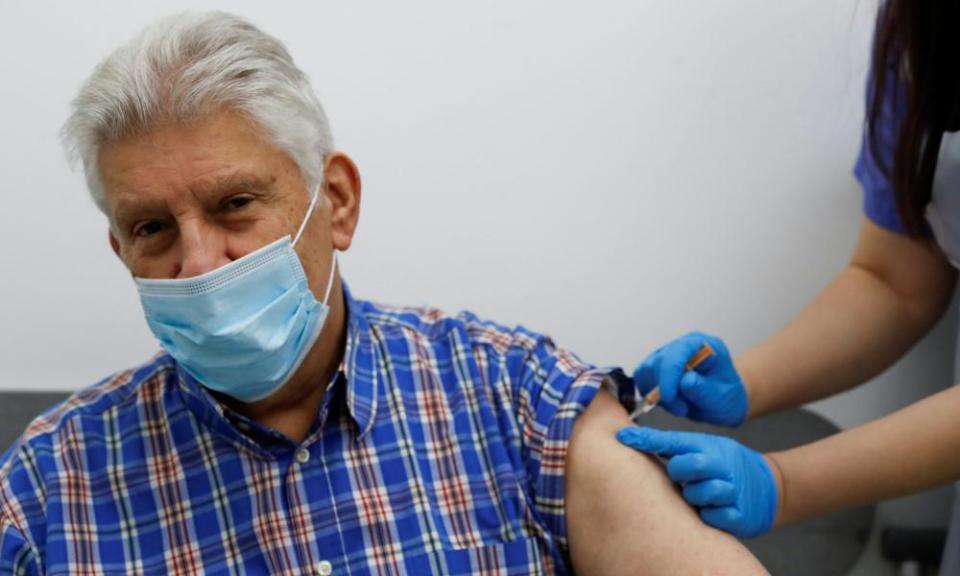'Too early' to say whether AstraZeneca Covid vaccine will go to older people in Australia

It is too early to say whether there will be age limitations placed on who receives the Oxford/AstraZeneca Covid-19 vaccine in Australia, the chair of the country’s advisory committee on vaccines has said.
The European Medicines Agency has suggested the vaccine may only be authorised for younger people in Europe but Prof Allen Cheng on Wednesday said Australia’s drug regulator, the Therapeutic Goods Administration (TGA), was still evaluating the AstraZeneca data.
“I’m not able to say whether there will be age limitations on the registration,” said Cheng, who is also the co-chair of the Australian Technical Advisory Group on Immunisation.
“However, this is clearly an important issue that they are looking at carefully. I understand that the European Medicines Agency is expected to make a decision shortly and that this issue has been highlighted by them.
Related: Australia expects AstraZeneca vaccine to be rolled out in March despite EU export threat
“The TGA is in communications with other major regulators including the European Medicines Agency and [the UK regulator] the Medicines and Healthcare products Regulatory Agency.”
The UK regulator in December gave temporary authorisation for the AstraZeneca vaccine to be administered to people in the UK aged 18 years and older. The agency has advised that “efficacy and safety data are currently limited in individuals ≥65 years of age” but did not say the cohort should be excluded from receiving the vaccine.
Watch: Thousands of Australians defy virus rules to protest 'Invasion Day'
Among the participants who received the AstraZeneca vaccine in clinical trials, 90.3% were aged 18 to 64 years and 9.7% were 65 years or older. Adverse reactions were generally milder and reported less frequently in those 65 and above, but the number of Covid-targeting antibodies produced by the 65 and older group 28 days after receiving the second dose of the vaccine was slightly lower than in those who were younger.
However, the UK regulator said most clinical trial participants 65 and above had their second vaccine dose six weeks after the first, which may have contributed to the lower antibody levels observed. Analysis has indicated that a stronger immune response is associated with a longer interval – up to 12 weeks – between doses.
Guardian Australia has contacted the office of the federal health minister, Greg Hunt, for comment on whether there will be enough supply of other vaccine candidates, such as the Pfizer vaccine, for older Australians if the AstraZeneca vaccine is not recommended for those aged 65 and above.
Australia has deals to receive 140m doses between the AstraZeneca, Pfizer and Novavax vaccines and may acquire more through the Covax facility. The prime minister, Scott Morrison, has previously said Australia will have one of the highest per capita rates of vaccine available in the world. Each of the vaccines requires two doses per person.
In an exclusive interview with Peruvian newspaper La Repubblica, the AstraZeneca chief executive, Pascal Soriot, said the vaccine clinical trials were conducted alongside Oxford University with rigour.
“The issue with the elderly data is not so much whether it works or not,” Soriot said. “It’s that we have today a limited amount of data in the older population. Oxford is an academy group. They’re very ethical and very academic. So they didn’t want to vaccinate older people until they had accumulated a lot of safety data in the 18 to 55 group. They said it was not ethical to vaccinate old people until they had enough safety data in younger people.
“Other companies took this risk, went ahead and vaccinated older people faster or earlier. If you start earlier, you have more data. Essentially, because Oxford started vaccinating older people later, we don’t have a huge number of older people who have been vaccinated. So that’s what the debate is. But we have strong data showing very strong antibody production against the virus in the elderly, similar to what we see in younger people. It’s possible that some countries, out of caution, will use our vaccine for the younger group.”
The interviewed followed now disproven reports from German media that the AstraZeneca vaccine is only 8% effective in those age 65 and above. AstraZeneca described the reports as “completely incorrect” and scientists also criticised the reports but did say more data on the vaccine’s efficacy in older adults was needed.
A professor of infectious diseases with the Australian National University, Peter Collignon, said given Australia was not rushing an emergency approval of the vaccine and had time to go through the full process, regulators could wait for more data.
Watch: What UK government COVID-19 support is available?
Related: Pfizer Covid vaccine approved for Australia rollout but PM warns jabs not 'a silver bullet'
“We are not taking shortcuts in Australia,” he said. “In every age group we need large-scale data collected even if it’s provisional data. Overall though, this vaccine is efficacious enough, safe enough and any side effects are manageable enough.”
In a statement, the University of Oxford said there was “no basis for the claims of very low efficacy of the Oxford-AstraZeneca vaccine which have been circulating in the media”.
“The results of the clinical trials have already been published transparently in five peer-reviewed scientific publications showing similar immune responses in younger and older adults and a good safety profile, and high efficacy in younger adults,” the university said.
“Furthermore, the preliminary efficacy data in older adults supports the importance of this vaccine for use in this population.”
Guardian Australia has contacted the TGA for comment.

 Yahoo Finance
Yahoo Finance 